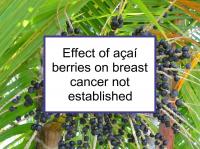Açaí berries are the fruit of the açaí palms (Euterpe oleracea and Euterpe precatoria), which are native to the Amazon River basin. Açaí berries have been shown to have potent antioxidant and anti-inflammatory activities and to protect coronary arteries from damage following exposure to free radicals.
Açaí berries are an excellent source of the anthocyanins cyanidin-3-glucoside and cyanidin-3-O-rutinoside. Açaí berries are also a modest source of the carotenoids alpha-carotene, beta-carotene and lutein. In addition, the berries contain some beta-sitosterol, ellagic acid, ferulic acid, fiber, syringic acid, and vanillic acid, most of which have been reported to have anti-cancer properties. Açaí extracts have been found to inhibit the growth and proliferation of lung, colon and prostate cancer cells, as well as leukemia cells in the laboratory.
Açaí berries contain high levels of fat compared to other berries, including oleic acid, palmitic acid, and linoleic acid.
Breast cancer-related effects of eating açaí berries
Cell and animal studies have demonstrated that açaí berries have anti-cancer activities, however the evidence is inconclusive.
Cell, animal and human studies
One study reported that animals fed açaí extract survived longer than control animals in a rat model of carcinogen-induced breast cancer. Two studies have reported that açaí extract caused a significant reduction in ER+/PR+ cell viability. In another study, an anthocyanin-rich extract of açaí berries was found to exert antiproliferative and proapoptic effects against rat brain cancer cells. However the same extract had no impact on the growth of triple negative breast cancer cells. One Brazilian study that examined the relationship between açaí consumption and chronic diseases was not able to reach a conclusion with respect to breast cancer. A 2022 study reported that açaí seed extract induced induced autophagy (a form of programmed cell death) in ER+/PR+ breast cancer cells.
Cyandin-3-glucoside
Cyanidins such as the cyandin-3-glucoside and cyanidin-3-O-rutinoside found in açaí berries have been reported to suppress angiogenesis by inhibiting tumor cell proliferation and migration. Cyandin-3-glucoside has also been shown to reduce HER2+ cell proliferation and interfere with the viability and metastatic potential of triple negative (ER-/PR-/HER2-) breast cancer cells. Cyandin-3-glucoside has also been shown to enhance the treatment effects of trastuzumab (Herceptin) in HER2+ breast cancer cells.
Additional comments
U.S. açaí products
Most açaí berry products marketed in the U.S. are produced from berries grown in the Amazon region of Brazil. The berries are highly perishable once harvested. Therefore, açaí berries normally are turned into a pulp (including the skin and flesh), freeze-dried, and made into a powder. This powder is exported to the U.S., where it is used to make açaí juice, açaí smoothies and açaí yogurt. Dried berries and frozen açaí purée are also available. One 2019 study of açaí products sold in the U.S. reported that they ranged widely in anthocyanin concentration.
Chagas Disease
In Latin America, fresh açaí juice is a source of Chagas Disease, a potentially deadly disease that can result in cardiac, gastrointestinal, and neurological damage. Chagas Disease is caused by a parasite, which is transmitted to açaí berries by triatomine, a blood-sucking insect. Contamination is believed to be caused by triatomine stools on the fruit or the insects themselves when inadvertently crushed during processing.
The conditions under which açaí berries are processed for export are much less likely to lead to contamination by the parasite than local Brazilian açaí juicing methods; there have been no reports in the U.S. of Chagas Disease associated with açaí consumption. However, açaí berry products should be purchased organic. Products made from açaí powder appear to be safer than products marketed as "fresh" açaí foods.
Potential drug interactions
Açaí berry-drug interactions (particularly cytochrome P450 (CYP)-mediated interactions) have been reported but are not well described. These have the potential to cause an enhancement or reduction in the efficacy of prescription drugs. Therefore, açaí berry products should not be consumed during chemotherapy or tamoxifen treatment.
Hearts of palm
Hearts of palm (palm hearts) are harvested from the same palms as açaí berries in the Amazon basin (other palm trees are also used in Central and South America). Hearts of palm are the undeveloped leaves of the palm (the bud). The palm hearts are collected and canned in the region before being exported. No information is available concerning hearts of palm and breast cancer.
Sources of information provided in this webpage
The information above, which is updated continually as new research becomes available, has been developed based solely on the results of academic studies. Clicking on any of the underlined terms will take you to its tag or webpage, which contain more extensive information.
Note that while we are continually searching for new evidence concerning this food, there is not much interest in it among cancer researchers so few recent or relevant studies are available.
